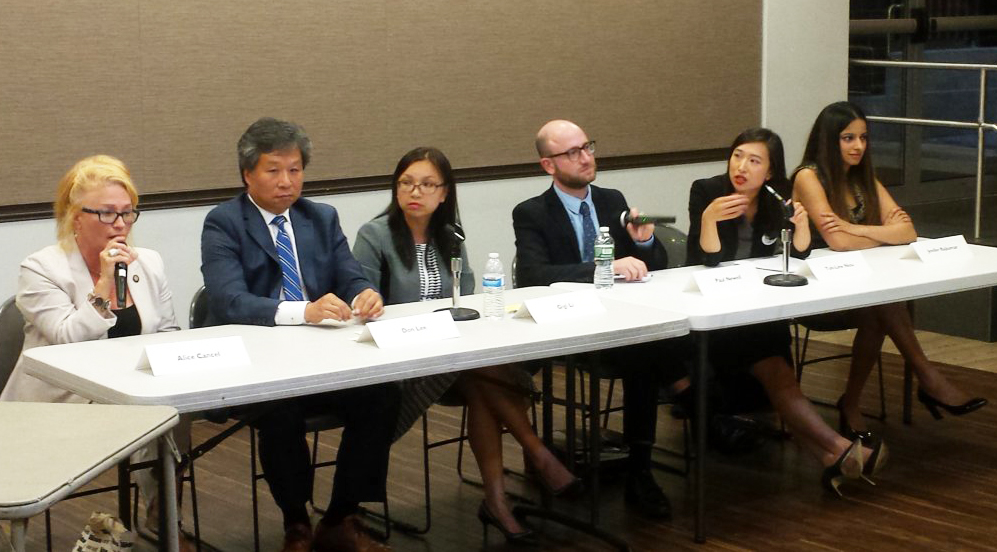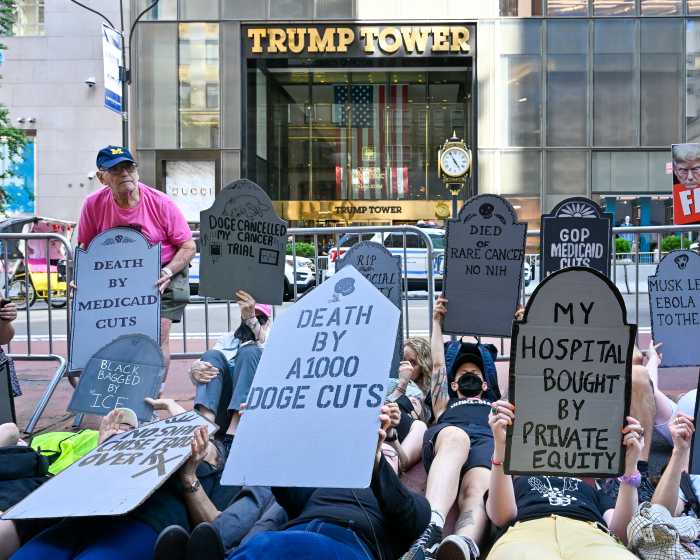
The six candidates contesting the Sept. 13 Democratic primary for the 65th-District Assembly seat — from left, Alice Cancel, Don Lee, Gigi Li, Paul Newell, Yuh-Line Niou, and Jenifer Rajkumar — can all agree on one thing: that the Battery Park City Authority needs to give residents a greater voice.
BY ALEX ELLEFSON
There’s at least one thing that all the candidates in the hotly contested Democratic primary for the 65th Assembly District seat agree on: the state-run Battery Park City Authority must give residents more of a voice in running their community.
The BPCA’s board, which is appointed by the governor, has come under fire for a series of unpopular decisions taken without community input — including hiring private security guards with no enforcement power to replace the city’s Parks Enforcement Patrol, and removing longtime leaders of the North Cove Marina and Battery Park City Parks Conservancy.
And the latest example is a push by the authority to remake South End Ave., in which an outside consultant was brought in to come up with an array of proposals that are now being presented to residents.
Several of the candidates say the plans shouldn’t go forward unless residents are given a more decisive role in determining what changes are made to the neighborhood’s main street.
“We need to take a step back and think about how we can give residents more input,” said Assembly candidate Gigi Li, the former chairwoman of Community Board 4, who held a rally at the corner of South End Ave. in early August to demand BPCA reform.
The project, which could involve replacing the covered pedestrian arcades along South End Ave. with retail space, is being pushed by the BPCA as a way to improve traffic safety improvements, but candidate Don Lee, a longtime Battery Park City resident and community activist, called the effort a subversive attempt to create more commercial space to generate revenue for the authority.
“If they want to redesign the neighborhood, that should be a separate conversation,” he said. “Let’s not comingle it with traffic safety because no one is going to say they don’t want traffic improvements to the area.”
Residents have taken issue with the small sample size of a survey the BPCA used to determine what changes to propose for the thoroughfare, and complain that the authority is holding community meetings on the plans at a time when many neighbors are out for summer vacations — concerns shared by Assembly candidate and Battery Park City resident Jenifer Rajkumar.
“There have been a number of important decisions where the community has been shut out,” said Rajkumar, adding that she is concerned about the BPCA’s proposal to replace the arcades with storefronts.
“This is space the community treasures,” she said.
Paul Newell, a longtime Democratic district leader now running for the assembly seat, said the BPCA’s track record demonstrates why residents should be given every opportunity to give input on the South End Ave. proposal.
“We have seen a string of decisions by the Battery Park City Authority that have been at odds with residents’ concerns,” he said. “There must be an ongoing conversation to make sure residents have a role in determining the specifics of the project.”
Candidate Yuh-Line Niou, former chief of staff for Queens Assemblyman Ron Kim, also said Battery Park City residents are justified in their concerns the BPCA will steamroll over their interests.
“I think a lot of residents are complaining they are not being heard,” she said. “I think it’s always an improvement to give the public more input because these are the folks who live there and their ideas need to be taken into account.”
Assemblymember Alice Cancel, who won the April special election to replace disgraced former Assembly Speaker Sheldon Silver and is now fending off five challengers during the district’s first competitive primary in decades, said the South End Ave. project “has not been brought to [her] attention.”
However, she has sponsored legislation, introduced earlier this year by state Sen. Daniel Squadron and Assemblymember Deborah Glick, requiring a majority of the authority’s board be BPC residents. Currently, only one board member, Martha Gallo, lives in the neighborhood.
“The people who live and work in Battery Park City should be the ones making the decisions,” Cancel said.
At her August rally, Li said the seven-member BPCA board should include at least three residents.
“Clearly, the residents here care very much about their neighborhood,” she said. “They want to be involved and I think it’s important we make every effort so they can be.”
Niou also agreed the BPCA is in need of reform.
“There a have been a lot of follies in the decision making process by the BPCA,” she said. “We must work to make sure residents have full and adequate representation in their community.”
Earlier this year, Rajkumar helped a local group called Democracy4BPC collect signatures for a petition calling for the governor to fill five of the authority’s board seats with community stakeholders
“Allowing the community to have more of a voice and putting more residents on the board is crucial to redefining the relationship between the community and the Battery Park City Authority,” Rajkumar said.
Lee said he wasn’t as concerned about how many board members live in the neighborhood as he was in making the BPCA’s decision-making process more democratic.
“What we need is more transparency and accountability,” he said. “The process needs to be more democratic, where the stakeholders have more of a say. That’s more important than who runs the authority.”
Newell argued that the BPCA’s board must be reformed, or it should be scrapped altogether.
“The BPCA has outlived its usefulness. It did tremendous good developing the neighborhood, but now it’s a question of governance,” he said. “We either need to have real, meaningful representation on the board or move to the city-control model proposed by Senator Squadron.”
Squadron has called for the city to take over BPC from the state — allowed through an agreement giving the city an option to take over the neighborhood by paying $1 and assuming the authority’s debts — and asked that the BPCA follow the lead of many other state authorities and allow the public to speak at the board’s meetings. He said he is pleased the candidates have taken an interest in the issue.
“The Battery Park City Authority is a critical issue to anyone who represents this community. It’s critical that the local Senator and Assemblymembers work together to deliver results. It’s our obligation as elected officials to build partnerships to make a difference for this community,” he said in a statement.
Democracy4BPC founder Justine Cuccia, whose group has collected more than 2,200 signatures on its petition, said she’s encouraged that all of the Democratic Assembly candidates took a stand on the BPCA governance issue.
And she agreed with Li that the South End Ave. project should be put on hold so the community can be more involved in the planning.
“The South End Ave. proposal was ill conceived and [the BPCA] went about it backwards. The community should be involved at the beginning of the decision-making process — not in the middle or the end,” she said.



































